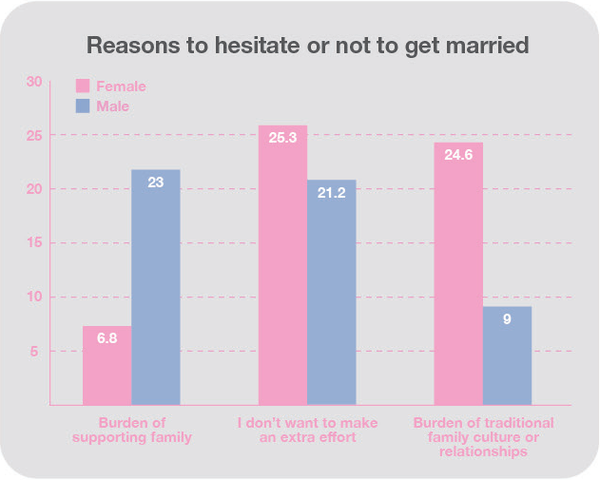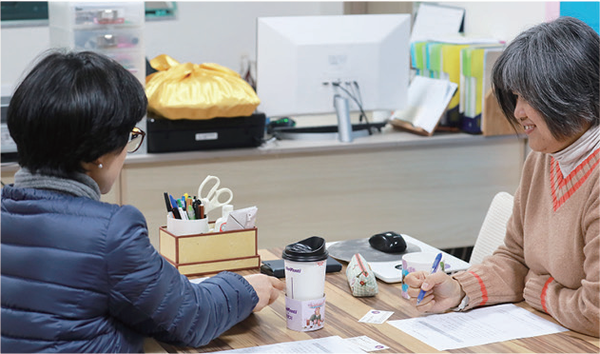As the marriage rate has steadily decreased, the ‘unmarried’ have become a hot topic among the public. There are many different opinions about those who remain unmarried. They share their voices below.
- Voice of Students
The JBNU Globe conducted an online survey to ask students' opinions on the decrease in marriage among young adults. The questionnaire consists of a total of three questions.
1. What do you think of the current marriage system in Korea?
-Kim Da-hui / Department of Child Studies
”In the past, men actively pursued careers mainly earned money and consumed money, but now women also actively work and love. Just as new words reflect the trend toward the younger generation, I think there should be a new direction for marriage to change the way it only follows existing customs and traditions. Various families such as single-parent families have to be encouraged, and different types of marriage should be accepted. If the marriage system changes and the welfare system increases, I think it will have a good effect on young adults who consider about being unmarried.”
-Song Hyeon-ha / Department of Politics and Diplomacy
“It is a typical system of a patriarchal society and does not recognize various types of families such as same-sex and transgender families. However, at the same time, it is an inevitable system for health care in Korea.”
-Anonymous student A: “I think the marriage system needs to change with the current because the forms of marriage are diversifying.”
-Anonymous student B: “I think it needs to be changed according to society, culture, and religion.”
2. Do you think the decreasing marriage rate of young adults is a social problem that must be solved?
-Kim Da-hui / Department of Child and Family Studies
“I never agree with the narrow and one-sided views like 'must get married' and 'must not get married'. Furthermore, I don't agree that there is an increase in people remaining unmarried and I think society should not force it but should encourage marriage in a positive way, whether it's a system or an incentive. Just as there is the comfort of a single-person household, there is the joy of making a family.”
-Song Hyeon-ha / Department of Politics and Diplomacy
“No.”
-Anonymous A: “Yes. The increase in unmarried young adults is one of the reasons for the low birth rate and ultimately, that is the reason there is a shortage of talented young adults in Korea. Furthermore, if the population continues to be an aging one, various social problems will arise and there will be inconveniences in solving them.”
-Anonymous B: “Yes, the principle of not marrying is connected with low birth rates and elderly problems.”
3. What do you think is causing the increase in unmarried young adults?
-Kim Da-hui / Department of Child and Family Studies
“In my case, this is because the development of social media has made me aware of different lifestyles and desires.”
-Song Hyeon-ha / Department of Politics and Diplomacy
“Employment difficulties, rising housing costs, and rising child-rearing costs.”
-Anonymous A: “The growth rate of the unmarried seems to be increasing due to children's education systems being centered in the capital city, private education costs, expensive housing costs, and the individualization of the public.”
-Anonymous B: ”As the word ‘freedom’ has become important to the younger generation, it seems that one’s own life has become a more important social atmosphere. Therefore, I think the promise of marriage with its various restrictions has become a little burdensome.”
● Statistics of Decreased Marriage Rate

Why do young people not want to get married? This online survey was conducted by the Ministry of Gender Equality and Family. This was conducted from October 17th to November 23th, 2020. The subjects of the survey were 10,101 people aged fifteen to thirty-nine. As a result, in the case of men, ‘the burden of supporting a family’ and ‘I don't want to make an extra effort’ ranked first and second respectively. In the case of women, ‘I don't want to make an extra effort’ and ‘the burden of traditional family culture on relationships’ were the first and second respectively.
● We Can Still Live Together: Talking with Women Activists Who Live Unmarried Life
The JBNU Globe visited ‘SpaceBB Cooperation’, which is located in Samcheon-dong, Jeonju. It was created in 2010 with the goal of creating a space for women who chose to remain single to share their daily lives with one another. In 2016, it was authorized as an official corporation and currently has eleven members. In 2019, to take it to the next level, activists who wanted to improve the housing rights of women living alone in their 50s and 60s gathered and created ‘BBcohousing Cooperation’. Lee Mi-jeong is an activist of SpaceBB Cooperation, and Kim Rany is the Board Chairman of BBchousing Cooperation.
Kim said, “the low birth rate and the aging population are always discussed together with those who are unmarried. In terms of demographics, public opinion is strong that a decrease in marriage will lead to a decrease in birth rates. From a long-term perspective, a decrease in the working population will adversely affect society. I think this is not appropriate, and I think we should avoid interpreting being unmarried by focusing on the demographics. An increase in the number of people available for work is completely different from an increase in the total population. Moreover, that claim represents only the position that marriage and childbirth are the productions of workers who will create the nation's wealth. If the unpaid housework, which has been carried out by women behind the scenes, is not on track, there will be problems in economic production, so it seems that the government is trying to prevent this. In the end, in the current Korean society, remaining unmarried can’t remain a personal choice and is prevented by economic coercion.”
They said that they are improving the housing rights of single women and serving as life partners for single women. BBcohousing Cooporation is putting its efforts into creating a residential environment where women can live safely by creating a ‘One-Person Household network’. It is also active in policy proposals.
Lee said, “there are inconveniences that inevitably arise when living alone. Sometimes, accompanying someone to go hospital is needed. The same goes for checking a home when no one is in the home or taking care of pets instead of the owner. Members take care of each other in such an emergency situation and stay close friends. We are not a legal family, and at the same time, not a typical family either. What really matters is that we are each other's safety nets.”
At the end of the interview, Kim had a message for young adults. “I hope that they will not make decisions based on the social atmosphere, which makes marriage and being unmarried completely dichotomous. The most important thing is to think about how you want to live. Please do not be trapped in a narrow mindset and try to live a life with many good people in your sphere of influence.”

| Ha Yae-one Editor, Yang Seo-jung Reporter

